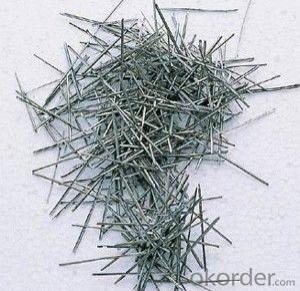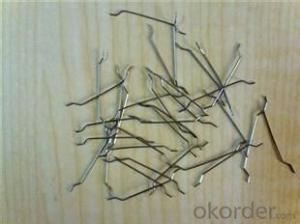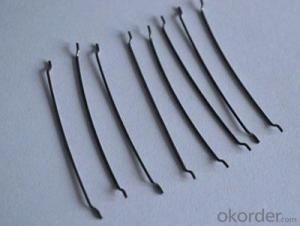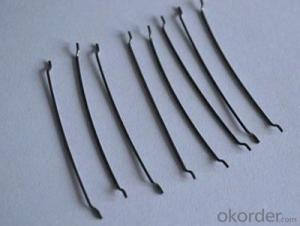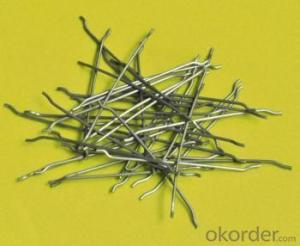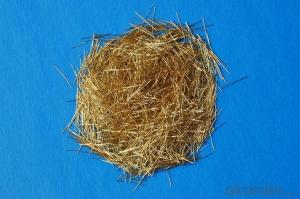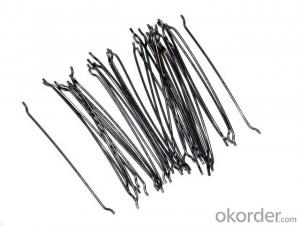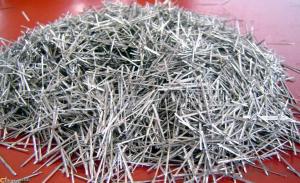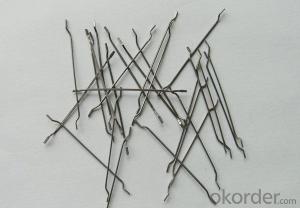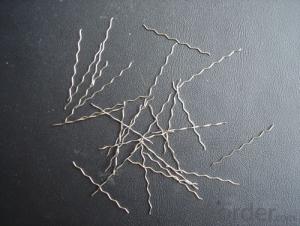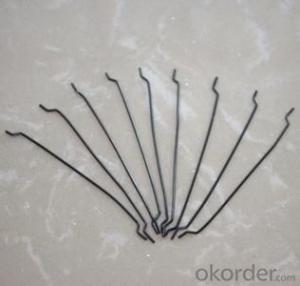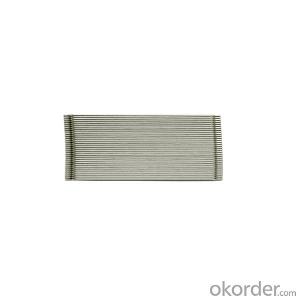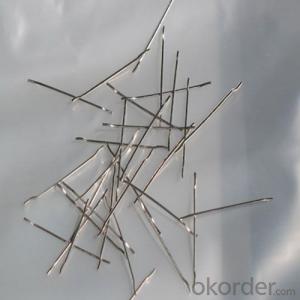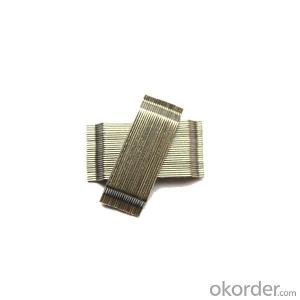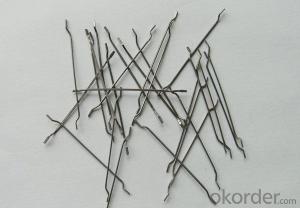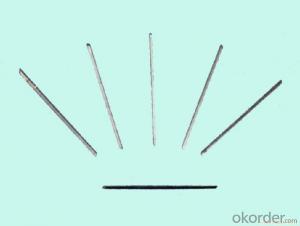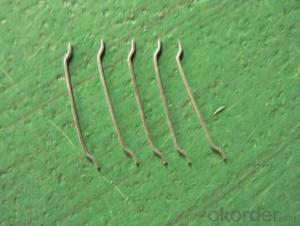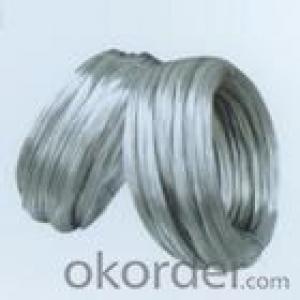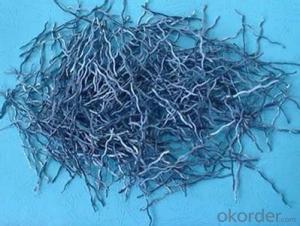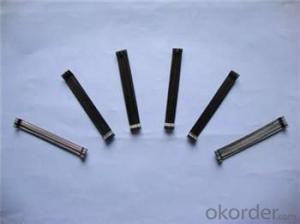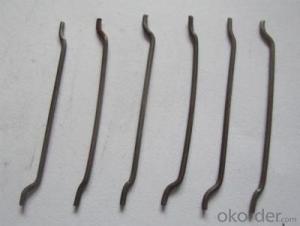Melt Extract Stainless Steel Fiber - China Supplier Concrete Steel Fiber from CNBM
- Loading Port:
- Tianjin
- Payment Terms:
- TT OR LC
- Min Order Qty:
- 1 m.t.
- Supply Capability:
- 600 m.t./month
OKorder Service Pledge
Quality Product, Order Online Tracking, Timely Delivery
OKorder Financial Service
Credit Rating, Credit Services, Credit Purchasing
You Might Also Like
Quick Details
Place of Origin: Tianjin, China (Mainland)
Model Number: 0.55
Material: Steel
Production Process: Cold drawn
Fiber Lengh: 35
Type: 1
Compressive Strength: >1200MPa
Aspect ratio: 63
Standard: ASTM A820M-11
Section Shape: Circular
Application: Concrete Reinforcement
Product Application: Industrial Floor
Packaging & Delivery
| Packaging Details: | 20 kg/Bag,50 bags/Pallet or 1,000kg/ Bulk Bag |
|---|---|
| Delivery Detail: | 1 Month |
Product Description
| Diameter | 0.55 mm (0.217 in) | ||
| Length | 35 mm (13.780 in) | ||
| Aspect Ratio | 63 | ||
| Tensile strength | 1200 MPa | ||
| Type | Cold drawn Steel Fiber | ||
| End | Hooked-end Steel Fiber | ||
| Glued/Loose | Glued Steel Fiber | ||
| Bending Angle | 45°(min.30°) | ||
| Usage & Performance | Floor:Trafficked areas and Industrial floors | ||
| Shotcrete :Slope stabilization and Final lining | |||
| Precast concrete:Pipe and Railway sleepers | |||
| Packing | Standard Export Pallet Packing | Bag Packing | 20 kg/Bag,50 bags/Pallet |
| Bulk Packing | 1,000kg/ Bulk Bag | ||
| Loading Quantity | 20’GP | 20-25 Tonne/Tonnes | |
| 40’GP | 25-27 Tonne/Tonnes | ||
| 40’HQ | 25-27 Tonne/Tonnes | ||
| MOQ | 1 kg for trial order | ||
| Supply Ability | 10,000 Tonne/Tonnes per Year | ||
| Payment Terms | T/T or L/C at sight | ||
| Delivery Time | Within 15 days after receiving deposit or original L/C at sight | ||
| Certification | ISO9001:2000, CE, | ||
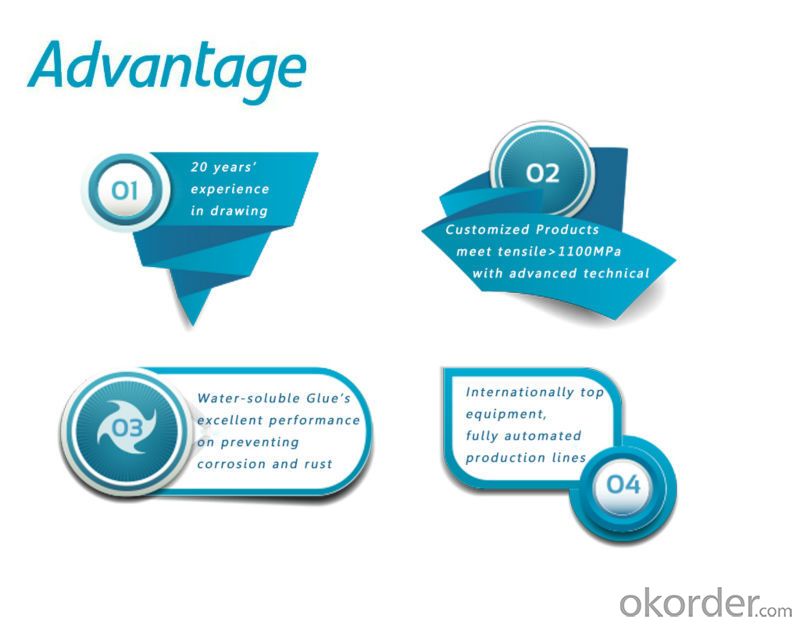
| Product | Diameter | Length mm/in | Aspect Ratio | Type | Packing |
| G-6030 | 0.5 mm (0.197 in) | 30 mm (11.811 in) | 60 | Glued | 20 kg/Bag, or 1,000kg/ Bulk Bag |
| G-6535 | 0.55 mm (0.217 in) | 35 mm (13.780 in) | 65 | Glued | 20 kg/Bag, or 1,000kg/ Bulk Bag |
| G-6035 | 0.6 mm (0.236 in) | 35 mm (13.780 in) | 60 | Glued | 20 kg/Bag, or 1,000kg/ Bulk Bag |
| G-8060 | 0.75 mm (0.295 in) | 60 mm (23.622 in) | 80 | Glued | 20 kg/Bag, 50 bags/Pallet |
| G-6060 | 0.9 mm (0.354 in) | 60 mm (23.622 in) | 60 | Glued | 20 kg/Bag, 50 bags/Pallet |
| G-6030 | 0.5 mm (0.197 in) | 30 mm (11.811 in) | 60 | Loose | 20 kg/Bag, or 1,000kg/ Bulk Bag |
| G-6535 | 0.55 mm (0.217 in) | 35 mm (13.780 in) | 65 | Loose | 20 kg/Bag, or 1,000kg/ Bulk Bag |
| G-6035 | 0.6 mm (0.236 in) | 35 mm (13.780 in) | 60 | Loose | 20 kg/Bag, or 1,000kg/ Bulk Bag |
| G-8060 | 0.75 mm (0.295 in) | 60 mm (23.622 in) | 80 | Loose | 20 kg/Bag, 50 bags/Pallet |
| G-6060 | 0.9 mm (0.354 in) | 60 mm (23.622 in) | 60 | Loose | 20 kg/Bag, 50 bags/Pallet |
- Q: What is the effect of melt extract stainless steel fiber on the thermal expansion of concrete?
- The melt extract stainless steel fiber has a significant effect on the thermal expansion of concrete. When added to the concrete mixture, these fibers act as reinforcement and help to improve the overall strength and durability of the concrete. In terms of thermal expansion, stainless steel fibers have a low coefficient of thermal expansion, meaning they do not expand or contract significantly with changes in temperature. This property helps to minimize the negative effects of thermal expansion on concrete. Concrete has a relatively high coefficient of thermal expansion, which means it expands and contracts significantly with temperature fluctuations. This can lead to cracking, deformation, and other forms of damage. However, when melt extract stainless steel fibers are added to the concrete, they help to distribute the stress caused by thermal expansion more evenly throughout the material. This reduces the likelihood of cracking and damage occurring. Furthermore, the stainless steel fibers also enhance the overall mechanical properties of the concrete, making it more resistant to various types of forces including thermal expansion. The fibers act as reinforcement, improving the tensile strength and ductility of the concrete, which helps it to withstand the stresses and strains caused by thermal expansion. Overall, the addition of melt extract stainless steel fibers to concrete has a positive effect on the material's thermal expansion properties. It helps to reduce the negative effects of thermal expansion, minimize cracking and damage, and improve the overall durability and strength of the concrete.
- Q: Is melt extract stainless steel fiber suitable for use in dam construction?
- Yes, melt extract stainless steel fiber is suitable for use in dam construction. Stainless steel fibers are known for their high tensile strength, corrosion resistance, and durability, making them an ideal material for reinforcing concrete in dam construction. The fibers can enhance the mechanical properties of concrete, such as crack resistance and impact resistance, thereby improving the overall structural integrity of the dam. Additionally, stainless steel fibers have excellent resistance to alkalis and chemicals, which are commonly found in dam environments. This ensures that the fibers will not degrade or corrode over time, further enhancing their suitability for dam construction.
- Q: How does melt extract stainless steel fiber enhance the impact resistance of concrete?
- Melt extract stainless steel fiber enhances the impact resistance of concrete by providing a reinforcing network within the material. The fibers disperse energy upon impact, effectively absorbing and redistributing the force throughout the concrete matrix. This reinforcement increases the overall toughness and durability of the concrete, reducing the likelihood of cracking or failure when subjected to impact loads.
- Q: The use and types of steel fibers
- Steel fiber came out for a short time, but the field of application is more and more extensive, and accordingly, the varieties of steel fiber are increasing again.
- Q: Can melt extract stainless steel fiber be used in tunnel construction?
- Melt extract stainless steel fiber is indeed applicable to tunnel construction. Renowned for their exceptional tensile strength, resistance to corrosion, and long-lasting nature, stainless steel fibers are perfectly suited for endeavors that demand structural integrity, like tunnel construction. These fibers have the ability to enhance the mechanical attributes of concrete, thereby bolstering its ability to withstand cracking, thermal expansion, and shrinkage. Moreover, they can serve as reinforcement within tunnel linings, thereby reducing the necessity for conventional reinforcement techniques like rebar. This leads to considerable cost savings and quicker completion times. All in all, melt extract stainless steel fiber is a trustworthy and efficient option when it comes to tunnel construction projects.
- Q: What is the effect of melt extract stainless steel fiber on the drying time of concrete?
- The use of melt extract stainless steel fiber in concrete can significantly reduce the drying time. The fibers help to enhance the drying process by improving the overall strength and durability of the concrete mixture. This, in turn, allows for faster evaporation of moisture, resulting in a shorter drying time for the concrete.
- Q: Steel fiber prices? (recent price)
- The main varieties of steel fiber are steel plate shearing type, steel wire cutting type and Steel Ingot Milling type. At present, shear steel fiber is the main application of steel fiber reinforced concrete in china.
- Q: What is the effect of melt extract stainless steel fiber on the impact resistance of floor slabs?
- The impact resistance of floor slabs can be positively influenced by the use of melt extract stainless steel fiber. These fibers enhance the overall toughness and durability of the slabs, making them more resilient to impact forces. Melt extract stainless steel fibers are renowned for their high tensile strength and exceptional crack resistance properties. When introduced into the concrete mixture, these fibers form a three-dimensional reinforcement network that aids in the distribution and dissipation of impact energy throughout the slab. This reinforcement network improves the floor slab's ability to endure heavy loads, including impacts from falling objects or heavy machinery. The presence of melt extract stainless steel fibers also helps to minimize crack propagation within the floor slab. Acting as micro-reinforcements, the fibers bridge the cracks and prevent them from expanding further. Consequently, the overall structural integrity and load-bearing capacity of the floor slab are enhanced. Additionally, the use of melt extract stainless steel fibers can reduce the risk of spalling or surface damage caused by impact. The fibers provide added support to the concrete matrix, preventing the formation of cracks and fractures on the slab's surface. This is particularly advantageous in areas with high foot traffic or industrial environments where the floor is frequently subjected to impacts. In summary, incorporating melt extract stainless steel fibers into floor slabs significantly enhances their ability to withstand impact. This results in a more durable and long-lasting flooring solution that can withstand heavy loads, impacts, and potential damages, ensuring a safer and more reliable surface for a variety of applications.
- Q: How does melt extract stainless steel fiber affect the workability of self-consolidating concrete?
- Melt extract stainless steel fiber can have a significant impact on the workability of self-consolidating concrete. This type of fiber, which is typically added to the concrete mix, enhances the overall performance and durability of the concrete. One of the key ways in which melt extract stainless steel fiber affects workability is by improving the flow characteristics of the concrete. Self-consolidating concrete is known for its ability to flow and fill complex forms without the need for mechanical vibration. The addition of stainless steel fibers helps maintain the required viscosity and flowability of the concrete while also preventing segregation and bleeding. Moreover, the presence of stainless steel fibers in the concrete mix improves the cohesion and stability of the mixture. This means that the concrete will have enhanced resistance to segregation and settling during placement and transportation. The fibers act as reinforcements, improving the overall structural integrity of the concrete. Additionally, melt extract stainless steel fibers also contribute to the crack resistance and toughness of self-consolidating concrete. The fibers help distribute the stress and load across the concrete matrix, reducing the likelihood of cracking and enhancing its ability to withstand external forces. This is particularly important in applications where the concrete may be subjected to high loads or harsh environments. However, it is worth noting that the workability of self-consolidating concrete can be affected by the dosage and aspect ratio of the stainless steel fibers. The optimal dosage and aspect ratio should be carefully determined to ensure that the desired workability is achieved without compromising the overall performance of the concrete. In conclusion, melt extract stainless steel fiber positively impacts the workability of self-consolidating concrete by improving its flow characteristics, cohesion, stability, crack resistance, and toughness. By carefully adjusting the dosage and aspect ratio of the fibers, the desired workability can be achieved while enhancing the overall performance and durability of the concrete.
- Q: How does melt extract stainless steel fiber affect the resistance of concrete to carbonation?
- The resistance of concrete to carbonation can be significantly improved through the use of melt extract stainless steel fiber. Carbonation arises when calcium hydroxide in the concrete reacts with carbon dioxide from the atmosphere, resulting in the formation of calcium carbonate. This process diminishes the alkalinity of the concrete, leading to a decline in its durability and strength. By incorporating stainless steel fibers into the concrete mixture, the carbonation process can be mitigated. These fibers serve as a physical barrier, preventing the entry of carbon dioxide into the concrete matrix. This barrier effect proves particularly effective in reducing the depth of carbonation, which is vital for maintaining the long-term endurance of concrete structures. Moreover, stainless steel fibers enhance the mechanical properties of the concrete. They elevate its tensile strength and ductility, rendering it more resistant to cracking and subsequent carbonation. Additionally, the fibers improve the bond between the cement paste and the aggregates, further bolstering the durability of the concrete. To sum up, the addition of melt extract stainless steel fiber to concrete substantially enhances its resistance to carbonation. It acts as a barrier against the ingress of carbon dioxide, diminishes the depth of carbonation, improves mechanical properties, and ultimately extends the service life of concrete structures.
Send your message to us
Melt Extract Stainless Steel Fiber - China Supplier Concrete Steel Fiber from CNBM
- Loading Port:
- Tianjin
- Payment Terms:
- TT OR LC
- Min Order Qty:
- 1 m.t.
- Supply Capability:
- 600 m.t./month
OKorder Service Pledge
Quality Product, Order Online Tracking, Timely Delivery
OKorder Financial Service
Credit Rating, Credit Services, Credit Purchasing
Similar products
Hot products
Hot Searches
Related keywords
